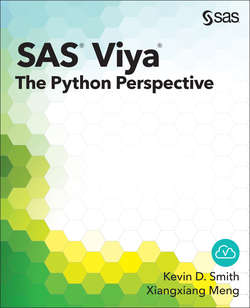Читать книгу SAS Viya - Kevin D. Smith - Страница 21
На сайте Литреса книга снята с продажи.
Automatic Type Casting
ОглавлениеSo far, we have constructed arguments using either the exact data types expected by the action or the arbitrary parameters in echo. However, the CAS action parameter processor on the server is flexible enough to allow passing in parameters of various types. If possible, those parameters are converted to the proper type before they are used by the action.
The easiest form of type casting to demonstrate is the conversion of strings to numeric values. If an action parameter takes a numeric value, but you pass in a string that contains a numeric representation as its content, the CAS action processor parses out the numeric and sends that value to the action. This behavior can be seen in the following action calls to history, which shows the action call history. The first call uses integers for first and last, but the second call uses strings. In either case, the result is the same due to the automatic conversion on the server side.
# Using integers
In [25]: out = conn.history(first=5, last=7)
NOTE: 5: action session.sessionname / name='py-session-1',
_apptag='UI', _messageLevel='error'; /* (SUCCESS) */
NOTE: 6: action builtins.echo...; /* (SUCCESS) */
NOTE: 7: action builtins.echo...; /* (SUCCESS) */
# Using strings as integer values
In [26]: out = conn.history(first='5', last='7')
NOTE: 5: action session.sessionname / name='py-session-1',
_apptag='UI', _messageLevel='error'; /* (SUCCESS) */
NOTE: 6: action builtins.echo...; /* (SUCCESS) */
NOTE: 7: action builtins.echo...; /* (SUCCESS) */
Although the server can do some conversions between types, it is generally a good idea to use the correct type. There is another type of automatic conversion that adds syntactical enhancement to action calls. This is the conversion of a scalar-valued parameter to a dictionary value. This is described in the next section.
